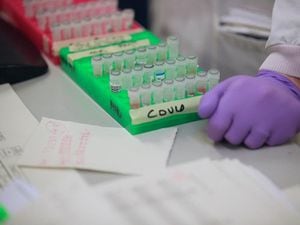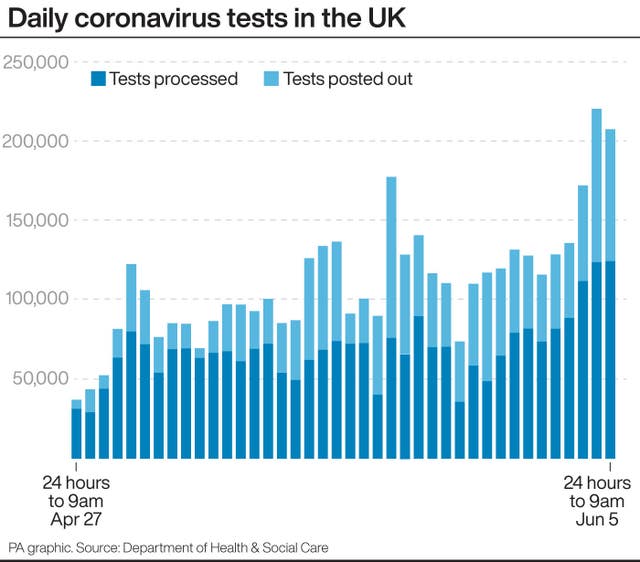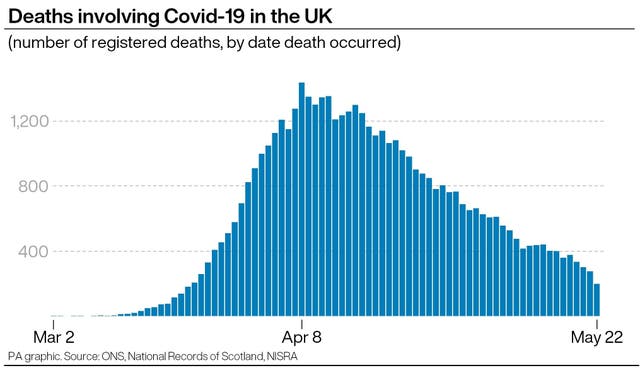Coronavirus transmission rate remains below one but is close
The ‘R value’ is considered critical to keeping coronavirus under control.

The Government’s scientific advisers believe the rate of coronavirus transmission has not breached the crucial value of one, despite evidence it is very close in some regions.
They acknowledged there might be some places in England where the ‘R value’ is close to one, which if exceeded could see the virus spread exponentially.
The Government’s value remained between 0.7 and 0.9 for the UK as a whole, though the figure has a two to three week lag, meaning it does not account for the latest easing of the lockdown.
And a report from Public Health England and Cambridge University, which estimates what the value is currently, said R is close to one in the North West and South West.
The research warned that there is some evidence the value has risen in all regions, saying it was probably due to increasing mobility and mixing between households and in public and work settings.
The R value is the average number of people an infected individual passes the virus onto and crucially, if that figure exceeds one, the disease could rapidly spread throughout the population again.
Boris Johnson’s plans to reduce the severity of restrictions have allowed for local lockdowns to be enforced to prevent the spread.
One crucial means of suppressing transmission is the NHS test and trace system, which seeks to track people down who have come into contact with an infected individual and tell them to isolate.

Downing Street was forced to defend the system after the Guardian reported that the scheme’s chief operating officer, Tony Prestedge, told staff it would not be at full speed until as late as October.
Ministers have been unable to say how many people have been traced under the system, but the Prime Minister’s official spokesman said: “Thousands of people who have tested positive have been contacted in a matter of days and their close contacts successfully traced, using both online services and over the phone.”
The lockdown was being eased across the UK, with Mr Johnson starting to send pupils back to school and permitting outdoor gatherings of up to six from Monday in England.
While the number of new infections appeared to be going down, Government scientific advisers believe the R rate is between 0.7 and 1 in England in their latest estimate.

The PHE and Cambridge modelling seeks to predict where it could stand now, and their estimate for Friday put the North West on 1.01 and the South West on 1.00.
The figure was lowest in the midlands at 0.9 and stood at 0.95 in London.
PHE medical director Dr Yvonne Doyle said: “Our estimates show that the regional R numbers have increased although they remain below one for most of England – this is to be expected as we gradually move out of lockdown.
“It is vital that everyone continues with social distancing, practising good hand hygiene and must remain at home and order a test if they have symptoms.”
PHE estimated that there are 17,000 new infections each day in England, with a range being at between 11,000 and 25,000.
But an Office for National Statistics figure put the new cases at 5,600 daily, down from around 8,000 a week ago.
That figure would mean fewer than one in every 1,000 people have Covid-19.
In other developments:
– British Airways’ parent company was considering taking legal action against the Government’s decision to impose a 14-day quarantine on international arrivals.
– The Equality and Human Rights Commission announced an official inquiry into the racial inequalities “laid bare” by the pandemic.
– Analysis by the PA news agency indicated that black, Asian and minority ethnic (Bame) staff accounted for 60% of frontline health workers whose deaths have been linked to Covid-19.
– Pharmaceutical giant AstraZeneca said it had started to manufacture a possible coronavirus vaccine so it can be made available in autumn if it passes human trials.
– Transport Secretary Grant Shapps said face covering should not be mandatory for shoppers, despite them becoming compulsory on public transport in England from June 15.





